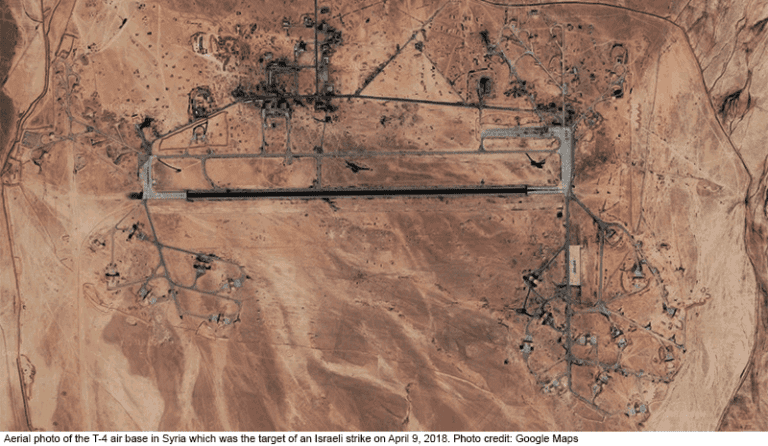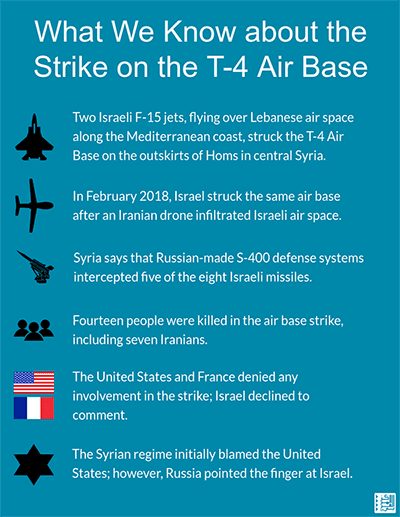
On April 9, shortly before 4 a.m. Damascus time, the Syrian military air base Tiyas (also known as T4) was targeted in what seemed to be an Israeli strike tacitly endorsed by the White House. The timing of this attack is crucial as President Donald Trump’s Administration continues to warn of an imminent strike against the Syrian regime for the use of chemical weapons in Duma near the capital, Damascus.
The T4 Air Base, the largest in Syria, is in the Homs governorate, north of Tiyas and west of the ancient city of Palmyra. Last February, the Israeli military accused the Syrian regime of allowing the Iranian Revolutionary Guard Corps to launch drones from this air base to fly over Israel and to transfer advanced weapons to Hezbollah and other Iranian-backed armed groups.
Israel’s Possible Motivations behind the Strike
 In simple terms, Israel seized the moment to reset the rules of engagement after the shooting down of its F-16 last February. In this context, Israeli air strikes should be separated from the international pressure on Russia and the Syrian regime regarding the suspected nerve gas attack in Duma. The Lebanese media reported that Israeli drones had flown over Akkar and Baalbek provinces along the Lebanese-Syrian border for three consecutive days starting Friday, April 6, which means that Israel had been scouting this target before the April 7 Duma attack. Moreover, Israeli officials paved the way for the rationale of this strike nearly 24 hours before it happened. One April 8, Public Security Minister Gilad Erdan said he hoped that the “American and international presence there will intensify” to stop the “genocide” in Syria.
In simple terms, Israel seized the moment to reset the rules of engagement after the shooting down of its F-16 last February. In this context, Israeli air strikes should be separated from the international pressure on Russia and the Syrian regime regarding the suspected nerve gas attack in Duma. The Lebanese media reported that Israeli drones had flown over Akkar and Baalbek provinces along the Lebanese-Syrian border for three consecutive days starting Friday, April 6, which means that Israel had been scouting this target before the April 7 Duma attack. Moreover, Israeli officials paved the way for the rationale of this strike nearly 24 hours before it happened. One April 8, Public Security Minister Gilad Erdan said he hoped that the “American and international presence there will intensify” to stop the “genocide” in Syria.
While the nature of the Israeli strike in Syria is not unprecedented, it seems to have three objectives:
- Rattling Moscow. For the first time since the Russian intervention began in Syria in September 2015, Israel did not notify the Kremlin ahead of a strike in the country. Israeli jets took the longer route along the Lebanese coast to avoid Russian radar. Israel indirectly blamed Russia for the S-400 defense system missiles that shot down the Israeli F-16 jet in February 2018.
- Preventing US withdrawal. After President Trump hinted, on March 29, of an imminent US withdrawal from Syria, he received a call from Israeli Prime Minister Benjamin Netanyahu. White House officials described the call as “tense”; Netanyahu expressed concerns that a US withdrawal would allow Iran to expand its influence. By notifying the White House ahead of the strike, Israel is attempting to draw the Trump Administration into the Syrian conflict.
- Sidetracking Gaza. International and domestic pressures were mounting regarding Israel’s excessive use of force against unarmed Palestinians in Gaza. Intentionally or unintentionally, the Israeli strike on the Syrian regime shifted attention away from Gaza, at least for now.
Beyond these immediate objectives, there might be long-term implications for the strike. Israel sees the gradual collapse of the US-Russian ceasefire agreement in southwest Syria as an opportunity to realign US-Israeli interests in Syria for the first time since 2014. The ball now is in the court of the Trump Administration.
Challenges for the US Strike on the Syrian Regime
After signaling on March 29 that US troops would leave “very soon” and “let other people take care” of Syria, Trump shifted his tone this week and affirmed that the Syrian regime would “pay a big price” and evoked the idea of humanitarian intervention (as evidenced by his remarks below). The Pentagon asked Trump for additional time to investigate the chemical attack (the assessment of which is not conclusively determined) and to ascertain who pulled the trigger; and the failure of Russia as the framework guarantor to uphold the agreement reached by the Organization for the Prohibition of Chemical Weapons (OPCW). The deal reached in September 2013 presumably led to the destruction of Syria’s chemical weapons arsenal, which then halted US plans to strike the Syrian regime after its deadly chemical weapons attack in Damascus in August 2013. As US officials are launching a full-court press against Moscow on this issue, Russia pushed back and vetoed a US draft resolution at the United Nations Security Council to investigate the chemical attack in Duma.
What US Officials Have Said about the Chemical Strike on Duma
Defense Secretary James Mattis
US Ambassador to the United Nations Nikki Haley
|
Since there was no Russian retaliation to the Israeli strike on April 9, the United States might be emboldened to act this week. However, these military options might be limited. A potential first scenario might be a repeat of the April 2017 model of launching Tomahawk missiles from the Eastern Mediterranean against Syrian regime targets without challenging the supremacy of the Russian Air Force in Syria. Two developments make the situation different this time, however. Unlike April 2017, US-Russian tensions have reached unprecedented levels in the past weeks. Hence, it remains to be seen if Washington will notify Moscow before acting, most notably if the US Air Force would be carrying out these strikes instead of the US Navy. The Trump Administration, this time, is closely coordinating with Paris and London to potentially launch a joint attack. French President Macron affirmed that Paris will launch strikes “to destroy the chemical weapons stocks”. The second and most dramatic scenario could be to ground all Syrian regime aircraft to prevent them from launching any additional chemical attacks. The question will be whether Russia will simply intercept US missiles, or it will retaliate, which could lead to the first direct US-Russian confrontation since the end of the Cold War. Moscow might not afford to take on two successive Israeli and US strikes on the Syrian regime without some sort of retaliation. On the other hand, the Israeli strike on April 9 might mitigate the need for a major US action.
American pressure might also serve as a form of psychological warfare to convince Moscow that it must restrain the activities of both the Syrian regime and Iran. So far, it is unclear to US policymakers how the Duma chemical attack decision was taken and whether there is daylight between Tehran, Moscow, and Damascus. Hence, Washington sees an opportunity to deter Russian influence as the Syrian regime continues to make territorial gains on the ground.
The White House should take caution against an Israeli attempt to entangle the United States in the Syrian war for the wrong reasons.
The crucial decisions for the White House are not only what punitive actions to take against the Syrian regime but how US policy in Syria will evolve moving forward. The argument for a premature US withdrawal has become weaker now, while Trump is under congressional pressure. Senator John McCain noted that Trump’s talk about a US withdrawal emboldened Assad, and he urged the president to take action in Syria. These developments come at a critical point in the Trump Administration as new hawkish civilian leaders are rising in the national security apparatus. Ambassador John Bolton assumed his new position as national security advisor on April 9, outgoing CIA Director Mike Pompeo has a confirmation hearing April 12 to become secretary of state, and former Pentagon advisor David Schenker was appointed on April 8 as the next assistant secretary of state for Near Eastern affairs. With this new team in place, the temptation to intervene in the Syrian conflict might be more likely than it was a year ago.
However, there are no indications that the United States is ready to become entangled in the Syrian war. White House spokesperson Sarah Sanders remarked that there is a separation between US withdrawal plans and deterring the Assad regime from using chemical weapons. What is clear, however, is that neither the United States nor Israel have the willingness or the ability to alter the balance of power in the region, one that is tilting toward Russia and its allies. Indeed, in a full confrontation with Russia and/or Iran, the United States and Israel have no allies on the ground. Kurdish forces are preoccupied with the Turkish intervention in northern Syria and will not fight a war to defend US interests. American and Israeli airpower cannot go far without ground support. While Israel is primarily concerned about Iran, the United States is focused on setting red lines for Russia’s role in Syria. Israel used the anger toward the Syrian regime’s Duma attack to settle scores with Russia and Iran. The White House should caution against an Israeli attempt to entangle the United States in the Syrian war for the wrong reasons.
The next few weeks might be decisive for Russian influence in Syria, in the wake of a triumphant trilateral Istanbul summit on April 4 between the presidents of Iran, Turkey, and Russia. Russia is on the defensive for the first time in Syria, as Israel turned against Moscow and Turkey has condemned the Duma attack and suggested on April 11 that Syrian President Bashar Assad should step down. The Kremlin seems willing to compromise in the face of American and international pressure, which should continue to increase. The magnitude of a US strike, however, should consider Russia’s calculations by not pushing Moscow all the way toward Iran.

